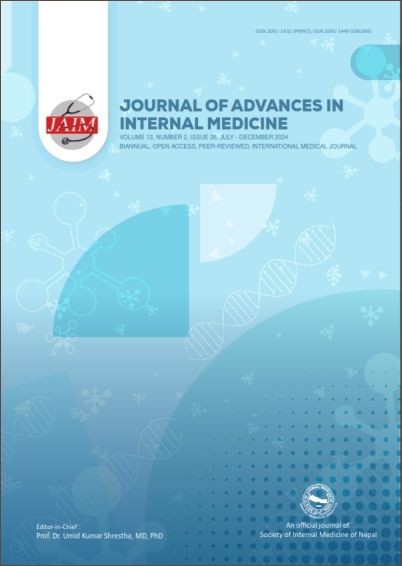Marburg Virus: A comprehensive examination of a critical pathogen
DOI:
https://doi.org/10.3126/jaim.v13i2.74078Keywords:
Cynomolgus macaques, Favipiravir, Galidesivir, Remdesivir, Marburg virus infectionAbstract
Marburg virus infection is a rare, severe zoonotic illness caused by the Marburg virus (MARV), with the primary reservoir being Egyptian fruit bats. Marburgviruses have reemerged on multiple occasions, resulting in a very high fatality ratio of up to 88% during the most significant outbreaks. MVD exhibits prominent clinical signs and symptoms such as haemorrhagic fever, coagulopathies, multi-organ failure in the affected individuals. This review provides insight into the MVD structure, genomic organisation, replication, clinical manifestations, and special emphasis on the available treatment strategies. Although no specific therapeutic interventions exist for management, supportive care like fluid administration and treatment of specific symptoms can improve survival rates and clinical outcomes. T-705 Favipiravir blocks the influenza virus's RNA-dependent RNA polymerase (RdRp) and suggests potential effectiveness in patients exhibiting lower viral loads. Remdesivir has shown efficacy in a study of MARV-infected Cynomolgus macaques; treatment improved clinical ratings, decreased plasma viral RNA, and boosted kidney and liver functions. BCX4430 Galidesivir showed 24-hour and 48-hour survival in animal groups after receiving the drug with no apparent toxicity and improved liver enzyme values.
MARV can induce significantly more severe epidemics than previously thought. These widespread outbreaks had a remarkably high mortality rate throughout a large geographical region, presenting substantial challenges in the field of medicine. High fever, haemorrhagic manifestation, organ failure, and coma are the prominent clinical signs of MVD. Supportive care and volume resuscitation are fervently recommended. Monoclonal antibodies and antivirals like Remdesivir and Favipiravir are potential treatment options; however, Galidesivir and Favipiravir can also be used.
Downloads
Downloads
Published
How to Cite
Issue
Section
License

This work is licensed under a Creative Commons Attribution 4.0 International License.
This license enables reusers to distribute, remix, adapt, and build upon the material in any medium or format, so long as attribution is given to the creator.




